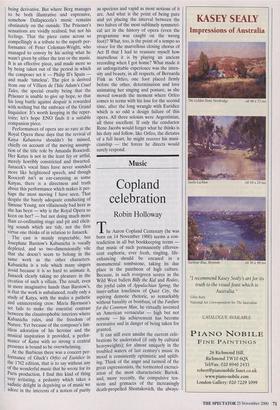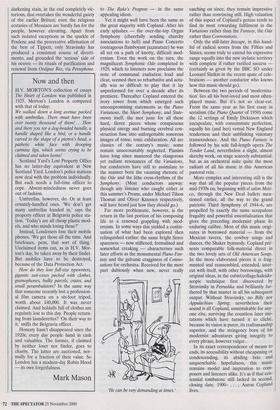Music
Copland celebration
Robin Holloway
The Aaron Copland Centenary (he was born on 14 November 1900) seems a con- tradiction in all but bookkeeping terms that music of such permanently efferves- cent euphoria, ever fresh, tingling, life- enhancing should be encased in a monumental tombstone, taking its due place in the pantheon of high culture. Because, in such evergreen scores as the Wild West ballets Billy the Kid and Rodeo, the joyful calm of Appalachian Spring, the inner-urban loneliness of Quiet City, the aspiring demotic rhetoric, so remarkably without banality or bombast, of the Fanfare for the Common Man, he virtually invented an American vernacular — high but not remote — his achievement has become normative and in danger of being taken for granted. It can still even amidst the current cele- brations be underrated (if only by cultural heavyweights); for almost uniquely in the troubled waters of last century's music its mood is consistently optimistic and uplift- ing. Think of the angst and turmoil of the great expressionists, the tormented excruci- ation of the most characteristic Bartok: and, more recently, the compulsive ten- sions and grimaces of the increasingly death-propelled Shostakovich, the always- darkening stain, in the end completely vic- torious, that overtakes the wonderful gaiety of the earlier Britten; even the religious ecstasies of Messiaen are hardly fun for the people, however elevating. Apart from such isolated exceptions as the sparkle of Poulenc and the procreative affirmation of the best of Tippett, only Stravinsky has produced a consistent course of diverti- mento, and grounded the 'serious' side of his oeuvre — its rituals of purification and renewal from Oedipus Rex, via Persephone. to The Rake's Progress — in the same appealing idiom.
Yet it might well have been the same as the great majority with Copland. After his early splashes — the over-the-top Organ Symphony (cheerfully sending churchy associations to hell) and Piano Concerto (outrageous flamboyant jazzmatazz) he was all set on a path of knotty, difficult mod- ernism. Even the work on the turn, the magnificent Symphonic Ode completed in 1929, which to listeners now proclaims the note of communal exaltation loud and clear, seemed then so rebarbative and actu- ally was so difficult to play that it lay unperformed for over a decade after its premiere. Thereafter Copland entered the ivory tower from which emerged such uncompromising statements as the Piano Variations, the Short Symphony, and State- ments itself, the mot juste for all these hard, fierce pieces whose conspicuous physical energy and burning cerebral con- struction fuse into unforgettable sonorous images of tense, tonic exhilaration. All are classics of the century's music: some remain unaccountably neglected. Pianists have long since mastered the clangorous yet radiant resonances of the Variations, but conductors have still to assimilate to the manner born the vaunting rhetoric of the Ode and the lithe cross-rhythms of the Symphony. (Most conductors anyway: though any listener who caught either at this summer's Proms, under Michael Tilson Thomas and Oliver Knussen respectively, will have heard just how they should go.) Far more problematic, however, is the return in the last portion of his composing life to a renewed grappling with mod- ernism. In some ways this yielded a contin- uation of what had been explored then relinquished earlier: the same bright fierce spareness — now stiffened, formalised and somewhat creaking — characterises such later efforts as the monumental Piano Fan- tasy and the galvanic cragginess of Conno- tations for orchestra. Received for the most part dubiously when new, never really `He can be very demanding at times.' catching on since, they remain impressive rather than convincing still. High valuation of this aspect of Copland's genius tends to find its most rewarding fulfilment in the Variations rather than the Fantasy, the Ode rather than Connotations.
Only the still-later Inscape, in this hand- ful of radical scores from the Fifties and Sixties, seems truly to extend his expressive range equally into the new stylistic territory with complete if rather rarified success (certainly as given by the BBC SO under Leonard Slatkin in the recent spate of cele- brations — another conductor who knows how this music should go).
Between the two periods of 'modernisa- tion' lies all his best-loved and most often- played music. But it's not so clear-cut. From the same year as his first essay in serialism (the Piano Quartet of 1950) come the 12 settings of Emily Dickinson which encapsulate, with consummate perfection, equally his (and her) vernal New England tenderness and their unblinking visionary transcendence. And the Piano Fantasy is followed by his sole full-length opera The Tender Land, nevertheless a slight, almost sketchy work, on stage scarcely substantial; but as an orchestral suite quite the most radiant of all his music in this American pastoral vein.
More complex and interesting still is the way that all the popular pieces from the mid-1930s on, beginning with el salon Mexi- co, through the New Deal ballets men- tioned earlier, all the way to the grand patriotic Third Symphony of 1944-6, are propelled by exactly the same scrupulous frugality and powerful essentialisation that gives the preceding modernist phase its enduring calibre. Most of this music origi- nates in borrowed material — from the Mexican tavern, the cowboy songs and dances, the Shaker hymnody. Copland pre- sents comparable folk-material direct in the two lovely sets of Old American Songs. In the more elaborated pieces it is frag- mented and reassembled, extended, inter- cut with itself, with other borrowings, with original ideas, in the cubist/collage/kaleido- scopic technique first discovered by Stravinsky in Petrushka and brilliantly fur- thered by that master in all his subsequent output. Without Stravinsky, no Billy nor Appalachian Spring: nevertheless their sound is all Copland, unmistakable for any- one else, surviving the countless later imi- tations which have turned it to cliché, because its vision is purer, its craftsmanship superior, and the stringency born of his modernist adventures giving integrity to every phrase, however vulgar.
In its exact correspondence of means to ends, its accessibility without cheapening or condescending, its abiding brio and unquenchable hopefulness, this music remains model and inspiration to com- posers and listeners alike. It's as if that cen- tennial tombstone still lacked its second, closing date. 1900— . . . ; Aaron Copland lives.






























































































 Previous page
Previous page